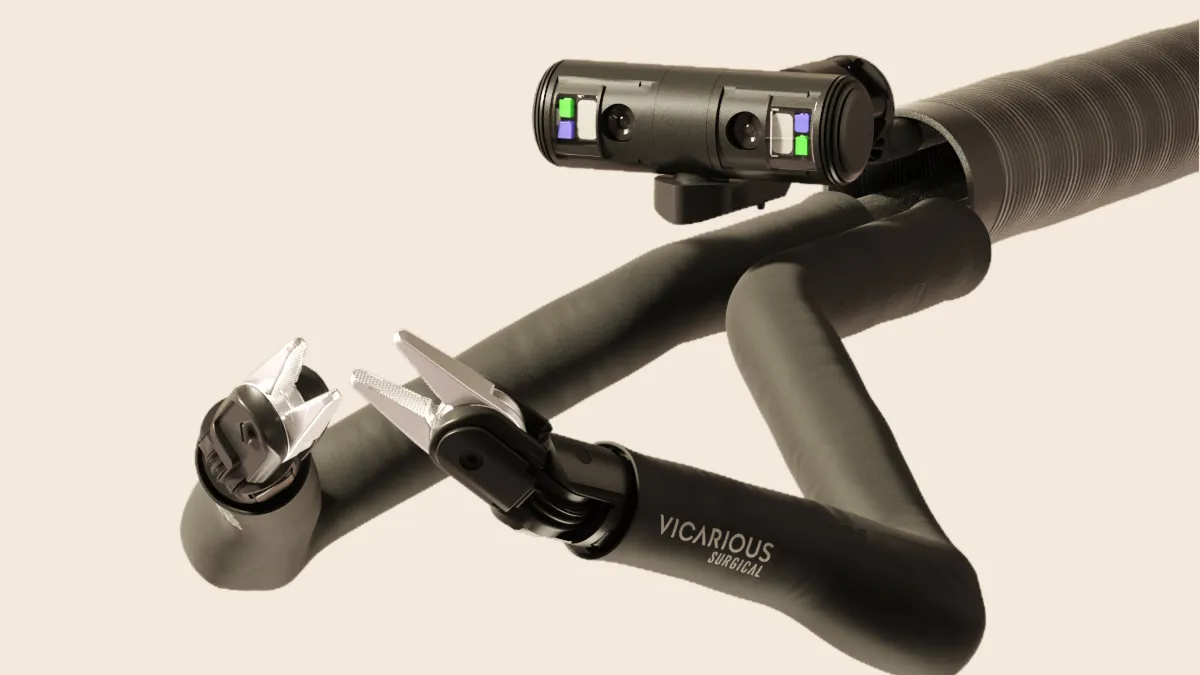As medical device companies continued to post first-quarter revenue results last week, executives discussed working through pandemic-driven equipment backlogs and new product launches.
Here’s what they had to say:
Vicarious Surgical, a startup that went public through a merger with a special-purpose acquisition company last year, shared more details on its first product — a surgical robot. The Waltham, Mass.-based company is looking to design a device for minimally invasive surgery with 3-D visualization using a VR headset.
CEO Adam Sachs said in March that the company planned to delay filing with the Food and Drug Administration by a year for the robot’s first indication, ventral hernia surgery. Instead of filing a 510(k) by late 2023, Sachs said Vicarious now plans to file for a de novo clearance by late 2024. The CEO chalked up the delay “due to the substantial differences between our technology and approved devices.”
Sachs reaffirmed that timing in a May 9 earnings call, adding that the company still planned to do a small, single-arm study without statistical significance. After that, Vicarious plans to run trials for three more indications: inguinal hernia, cholecystectomy, and hysterectomy.
“Overall, the plan to do clinical trials, it's actually always been the plan for every indication, with the exception that [with] ventral hernia, we had intended to do it post FDA filing,” the CEO said.
Analyst Quote
“In this market environment companies such as Vicarious Surgical, who are post-SPAC, pre-commercial can be the victims of a 'shoot first, ask questions later' risk appetite from many investors.”

BTIG analysts
May 9 research note
Procedure rebounds & backlogs
Globus Medical, which makes spine, joint reconstruction and imaging products, posted a 1.4% increase in sales to $230.5 million in the first quarter compared with the year-earlier period.
Globus’ CEO resigned suddenly last month and the company didn't discuss its leadership change.
CFO Keith Pfeil said that COVID-19 cases had an impact on procedural volumes early in the quarter. While volumes started to improve in February, “we did not see consistent momentum building until March,” he added.
Like Intuitive Surgical and Stryker, Globus also reported a slowdown in deployments of its surgical robots in hospitals. The companies attributed this to hospitals shifting their focus to manage the surge of COVID-19 cases at the beginning of the year on top of staffing shortages.
Globus began shipping its new Excelsius3D imaging system in May. The company declined to forecast sales of the devices this year, but said it had “more than double digit orders.”
Medical device sterilization company Steris rounded out the week with its sales report on May 12. The Dublin-based firm said revenue in the first quarter rose 39% year to $1.2 billion. This includes about $141.7 million from acquisitions.
CEO Daniel Caresito told analysts that the company was seeing a “fairly robust recovery” in procedure volumes on a quarter-to-quarter basis, but that there’s still “quite a ways to go” to get back to pre-pandemic levels. Steris also started the year with an “all-time record” backlog from a capital equipment perspective, Caresito said.
Keybanc analysts wrote in a research note that there were “multiple incremental tailwinds” supporting Steris’ forecast of 11% revenue growth in fiscal year 2023 (which starts in April). Those include pricing, normalization of procedure volumes and working through some of the capital equipment backlog.
Looking ahead
Here are a few calls to watch as the earnings season finishes:
- Pear Therapeutics — May 16 at 4:30 pm ET
- Medtronic — May 26 at 8 am ET












